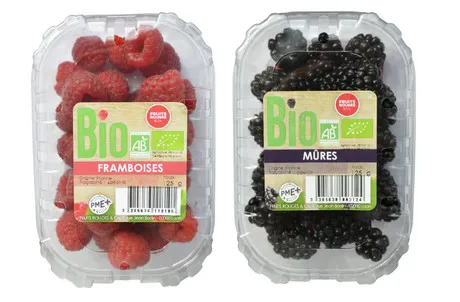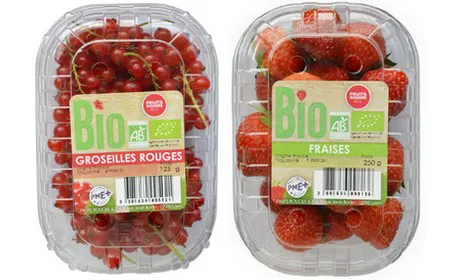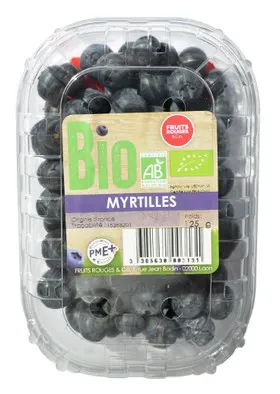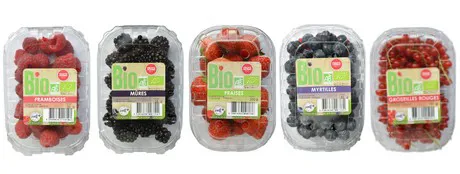Fruits Rouges & Co has already been offering organic processed fruits for 2-3 years, but the company launched its organic range of red fruits on the fresh market last April. “Our goal today is to propose an organic range from the French origin (high demand from French consumers) with a complementary offer from third countries to expand the marketing calendar,” explains Thomas Danis, former buyer for supermarkets who joined the Fruits Rouges & Co team with the intention of developing the organic offer.

In search of new organic producers in France
Today, the company Fruits Rouges & Co seeks to increase its organic production areas in France. “This year, we marketed 25 tons of organic red fruits from France, mostly strawberries, raspberries and blueberries. Next year, we aim for 100 tons with a significant expansion of surfaces at our producers in France. We will also expand in Morocco where we plan to double the surface by 2021,” explains Thomas.
In order to meet this increasing demand with a qualitative offer, the company is currently in search of new producers and invests heavily in supporting those who are in conversion. “The demand for organic red fruits is such in France that the current supply is insufficient. We are really looking for new organic producers. The producers we have are not enough and those in conversion will officially be organic in 2021. For this change to last, we organize meetings between producers in order to share information on farming practices, yields… We participate financially in the purchase of plants and guide them on the best varieties that meet the expectations from supermarkets,” explains Thomas. The company will go from 6 producers this year to about 15 next year.
The challenges of red fruit production
While there is definitely a demand for organic red fruits, their production is an ambitious gamble which, according to Thomas, can face a number of challenges. “One of the difficulties is to find reliable producers with a qualitative production. Red fruits are relatively fragile fruits. Their production requires a lot of observations and a meticulous follow-up. This is particularly true of the strawberry, a difficult and demanding fruit to produce. Growing organic strawberries also means cultivating in the ground, which increases the difficulty of the harvest.”
“Given the production difficulties, few actors are able to propose an organic offer of quality. Moreover, targeting large retailers implies other requirements than direct sales. First of all, to deal with supermarkets, one needs volumes. It is also necessary to have irreproachable quality, both in terms of taste and preservation on the shelves. The specifications for organic products are very strict. In order to meet these requirements and satisfy the demand of our clients, we really selected the retailers with whom we wish to develop our range. We are already in great demand (including export), but we do not want to grow too fast so we can ensure real sustainability in our development.”
The production of organic red fruits presents a number of challenges, but Fruits Rouges & Co makes paying its committed producers a priority. “We are completely transparent about prices. It is very important for us to obtain the best possible price for our producers, in order to show them that we can very well make a living by producing organic red fruits. The goal is to increase their production and to have them convert. Besides, the prices of organic red fruits are also less volatile than those of conventional red fruits. With the demand not being met, organic prices are much more stable,” explains Thomas.
A promising future for the organic blueberry

Some red fruits are easier to produce organically than others. It is the case of the blueberry. “We are among the pioneers in the development of the blueberry market in France. Contrary to other red fruits, the blueberry is much more robust. The bushes are more rustic and more resistant. It is therefore easier to convert to an organic blueberry production than it is for strawberries or raspberries. As a consequence, the difference in the price of blueberries is not excessive, at 30%, while there is a gap of 50 to 80% for raspberries. Besides, blueberry orchards reach full production after three years. For example, we have one that gave us 14 tons this year and it will give us 20-25 tons next year. The demand keeps increasing. The Red Fruits category has experienced an annual intrinsic growth of about +25% for some time now. Consumers’ expectations are changing, the market is transforming very rapidly, and the varietal research that follows is bearing fruit. We are progressing both in terms of quality and supply. Our goal is to segment the range on the shelves and to accompany our partners in the development of their red fruit category. As far as we are concerned, we will soon sell more blueberries than raspberries. It is a popular product that is full of health benefits, tasty and keeps well on the shelves.
In order to promote this new range and include the organic production in a global approach, Fruits Rouges & Co will offer the range, as early as next year, in a packaging free of plastic and 100% biodegradable.
For more information:
Les Fruits Rouges
1, rue Jean Bodin
02000 Laon, France
Phone: +33(0)3 23 28 49 49
Fax: +33(0)3 23 79 45 80
[email protected]
www.fruitsrougesandco.com
